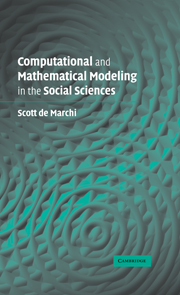Book contents
- Frontmatter
- Contents
- Acknowledgments
- Prelude
- 1 Not All Fun and Games: Challenges in Mathematical Modeling
- 2 Looking for Car Keys Without Any Street Lights
- 3 From Curses to Complexity: The Justification for Computational Modeling
- 4 Why Everything Should Look Like a Nail: Deriving Parsimonious Encodings for Complex Games
- 5 KKV Redux: Deriving and Testing Logical Implications
- 6 A Short Conclusion
- References
- Index
6 - A Short Conclusion
Published online by Cambridge University Press: 23 July 2009
- Frontmatter
- Contents
- Acknowledgments
- Prelude
- 1 Not All Fun and Games: Challenges in Mathematical Modeling
- 2 Looking for Car Keys Without Any Street Lights
- 3 From Curses to Complexity: The Justification for Computational Modeling
- 4 Why Everything Should Look Like a Nail: Deriving Parsimonious Encodings for Complex Games
- 5 KKV Redux: Deriving and Testing Logical Implications
- 6 A Short Conclusion
- References
- Index
Summary
Despite the suspicion that often arises between the methodological camps, it is my belief that most researchers in social science want to move in the same direction. We all have a desire to understand how economic and political actors (ranging from individual voters to crowds to nation states) make decisions. To the extent we understand social science, any of us would be happy to have policy relevance. As noted by Friedman (1953) and Granger (1999), the research community has many shared beliefs – we all, more or less, agree on what “the good” is in terms of outcomes. What we disagree about is methodology, because it is not obvious which approach provides the most leverage in understanding the world. Put another way, while we might all agree on the merits of preventing nuclear warfare, the more salient question is how to discriminate good models and good advice from bad.
Part of the problem is that the social sciences do not have a shared understanding of what constitutes a reasonable question. Too often, asking a good question is confused with providing a good answer. One might want to understand the causes of a particular event (say, World War II), but, without a great deal of care, a few cases do not constitute a coherent problem suitable for research. As I have argued throughout, the main problem that confronts us in research design is the curse of dimensionality. It cannot be ignored, whatever one's methodological orientation.
- Type
- Chapter
- Information
- Computational and Mathematical Modeling in the Social Sciences , pp. 176 - 180Publisher: Cambridge University PressPrint publication year: 2005



